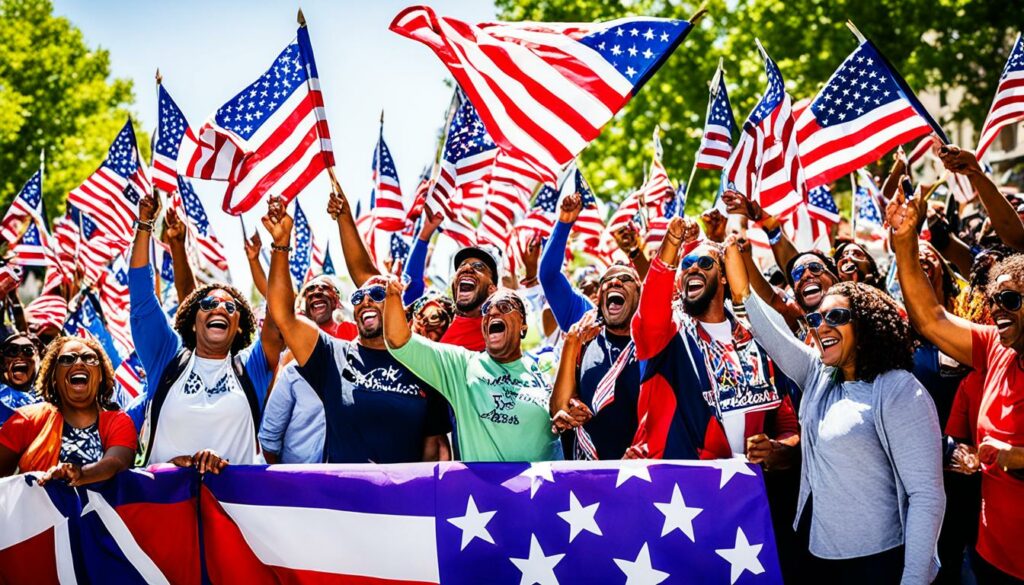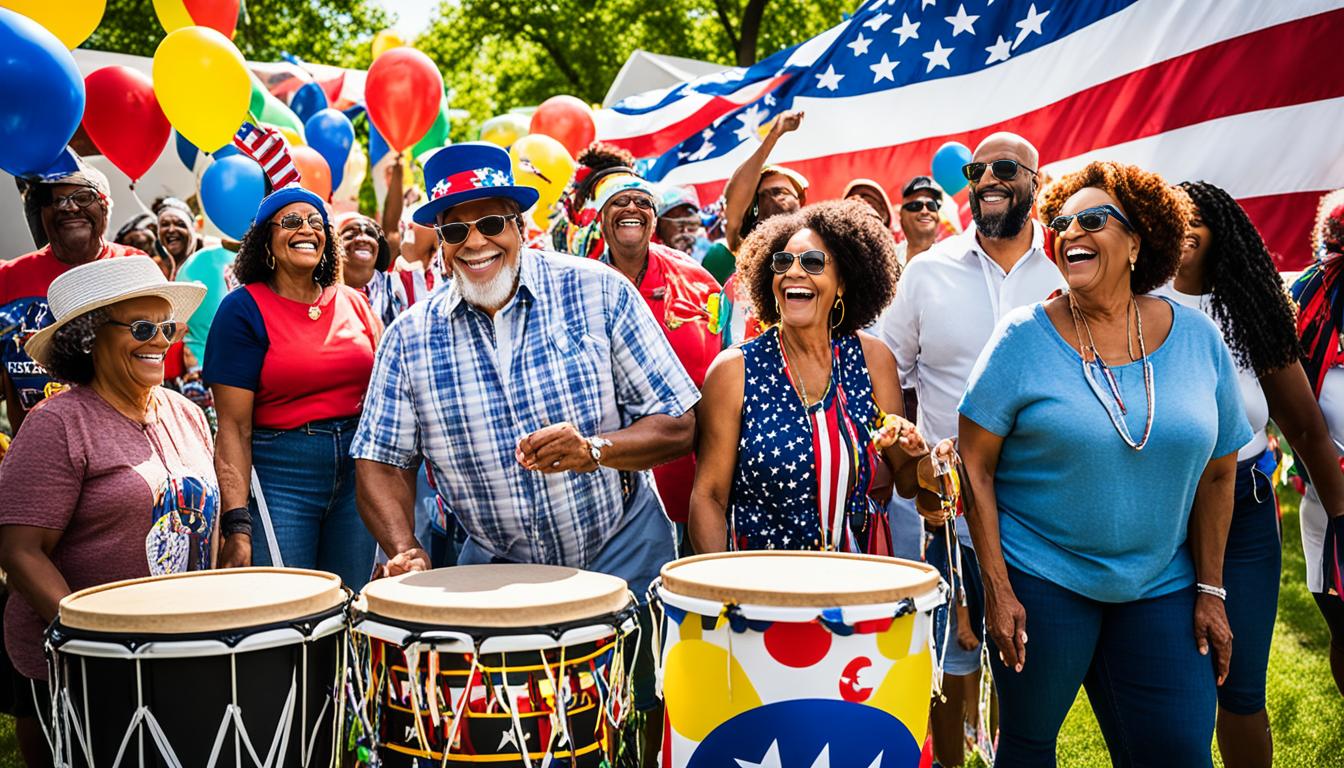Understanding What Is Juneteenth: A Quick Guide
Juneteenth is a significant annual commemoration that marks the end of slavery in the United States. It holds immense historical and cultural importance, as it represents the day when enslaved African Americans in Texas were informed of their freedom on June 19, 1865, following the end of the Civil War. This date is now celebrated as Juneteenth and has been observed by the African American community since the late 1800s.
The significance of Juneteenth lies in its role as a symbol of emancipation and liberation for African Americans. It commemorates their resilience, determination, and struggle for freedom in the face of adversity. Juneteenth is now recognized as a federal holiday in the United States, highlighting its enduring relevance and impact on American history.
Key Takeaways:
- Juneteenth is an annual commemoration of the end of slavery in the United States.
- It marks the day on June 19, 1865, when enslaved African Americans in Texas were told they were free.
- Juneteenth holds historical and cultural significance and is now recognized as a federal holiday.
- It symbolizes emancipation, resilience, and the struggles faced by African Americans.
- Juneteenth highlights the ongoing relevance and importance of cultural heritage and promotes inclusivity in the United States.
The Origins of Juneteenth

Juneteenth, also known as “Juneteenth Independence Day,” “Freedom Day,” or “Emancipation Day,” has its roots in a historic event that took place on June 19, 1865. This significant day marked the beginning of the Juneteenth celebrations and holds great importance in American history.
In 1863, President Abraham Lincoln issued the Emancipation Proclamation, declaring that all enslaved individuals in Confederate territory were to be set free. However, news of this proclamation took time to reach all parts of the country, particularly in Texas, where many enslaved African Americans were still laboring under oppressive conditions.
It wasn’t until June 19, 1865, when General Gordon Granger arrived in Galveston, Texas, that the enslaved African Americans in the region were informed of their freedom. General Granger’s arrival marked a turning point and brought the Emancipation Proclamation into effect in Texas, leading to the celebration of Juneteenth.
“The people of Texas are informed that, in accordance with a proclamation from the Executive of the United States, all slaves are free.”
This announcement by General Granger was met with a mixture of emotions, including joy, relief, and disbelief, as enslaved African Americans came to terms with their newfound freedom after years of oppression and bondage. Juneteenth became a day of remembrance and celebration, symbolizing hope for a better future and the end of the Civil War.
The origins of Juneteenth serve as a reminder of the struggles and triumphs of African Americans, their resilience in the face of adversity, and their ongoing fight for equality and justice.
Key Events Leading to Juneteenth
| Event | Date |
|---|---|
| President Abraham Lincoln issues the Emancipation Proclamation | January 1, 1863 |
| Robert E. Lee surrenders, effectively ending the Civil War | April 9, 1865 |
| General Gordon Granger arrives in Galveston, Texas | June 19, 1865 |
| Enslaved African Americans in Texas learn of their freedom | June 19, 1865 |
| Juneteenth celebrations begin | June 19, 1865 |
The Historical Significance of Juneteenth
Juneteenth holds historical significance as it represents the second independence day for the United States. It is celebrated as a symbol of freedom and liberation for enslaved African Americans. Additionally, Juneteenth coincided with the Reconstruction era, a period of hope, uncertainty, and struggle for the nation as a whole. Formerly enslaved people sought to reunify families, establish schools, enter political office, and push for radical legislation, transforming their lives and the country.
| Aspect | Description |
|---|---|
| Second Independence Day | Juneteenth is revered as a second independence day for the United States, marking the end of slavery and the beginning of a new chapter of freedom and equality. |
| Reconstruction Era | The celebration of Juneteenth coincided with the Reconstruction era, a time of great hope, but also struggle and uncertainty, as the nation worked to rebuild and redefine itself following the Civil War. |
| Hope and Struggle | Juneteenth represents the hope and struggle of formerly enslaved African Americans as they fought to reunify families, establish schools, hold political office, and advocate for radical changes aimed at eradicating systemic racism. |
“Juneteenth is not only a celebration, but a reminder of the journey towards freedom and the ongoing fight for equality.” – Civil Rights Activist
Juneteenth Becomes a Federal Holiday

In 2021, Juneteenth received a momentous recognition as it was designated as a federal holiday by President Biden. This decision came in response to the renewed interest and nationwide protests against racial injustice that gained momentum during the summer of 2020. The official acknowledgment of Juneteenth as a federal holiday highlights its growing importance and underscores its significant place in American history.
| Year | Date | Significance |
|---|---|---|
| 1865 | June 19 | The day enslaved African Americans in Texas were told they were free. |
| 2021 | June 17 | Juenteenth becomes a federal holiday. |
President Biden’s declaration of Juneteenth as a federal holiday serves as a powerful step towards acknowledging the struggles and contributions of African Americans. It represents a significant milestone in the ongoing journey towards racial equality and social justice. The federal holiday status ensures that Juneteenth receives nationwide recognition and commemorates the liberation of enslaved African Americans in the United States.
“I am proud to officially declare Juneteenth as a federal holiday, marking its enduring significance and embracing the values of freedom, equality, and unity,” President Biden stated. “This commemoration serves as a testament to our shared commitment to eradicating racial inequities and building a more inclusive society for future generations.”
“Juneteenth becoming a federal holiday not only commemorates the end of slavery in the United States but also acknowledges the ongoing struggle for racial justice,” said civil rights advocate, Angela Davis. “It is an important step towards recognizing the historical significance and cultural heritage of African Americans.”
How Juneteenth is Celebrated

Juneteenth is a day of celebration and reflection, marked by a variety of festivities and meaningful activities. From vibrant cookouts and barbecues to engaging community service initiatives and educational panels, the Juneteenth experience is diverse and enriching.
One of the most cherished aspects of Juneteenth is the opportunity for families and friends to come together and enjoy outdoor activities. Cookouts and barbecues are commonly held, where people gather around delicious food and share stories, laughter, and unity.
Community service plays a vital role in Juneteenth celebrations, as individuals strive to give back to their communities and contribute to positive change. Volunteering and engaging in acts of service are powerful ways to honor the spirit of Juneteenth and make a difference in the lives of others.
Education panels are another significant component of Juneteenth festivities. These panels provide platforms for thought-provoking discussions, informative presentations, and the sharing of knowledge about African American history and the ongoing fight for equality. They foster understanding, promote dialogue, and inspire personal growth.
Juneteenth allows us to gather as a community and celebrate the progress we’ve made, while also recognizing the work that still needs to be done. It’s a time to honor our ancestors and reflect on the enduring legacy of resilience and empowerment. – Tiffany Jenkins, Juneteenth organizer
Throughout Juneteenth celebrations, cultural performances take center stage, showcasing the rich artistic expressions of the African American community. Music, dance, spoken word, and visual arts provide a platform for creativity, storytelling, and the celebration of cultural heritage.
Juneteenth festivities are a testament to the resilience, strength, and triumph of African Americans throughout history. They serve as a reminder of the continued fight for equality and justice while celebrating the achievements and contributions of the community.
To visualize the diverse ways Juneteenth is celebrated across the country, here is a table highlighting some of the common activities:
| Juneteenth Festivities | Description |
|---|---|
| Cookouts and Barbecues | Gatherings with family and friends to enjoy delicious food and celebrate unity |
| Community Service | Volunteering and acts of service to give back to the community and promote positive change |
| Education Panels | Informative discussions, presentations, and knowledge sharing about African American history |
| Cultural Performances | Music, dance, spoken word, and visual arts showcasing the artistic expressions of the community |
Juneteenth celebrations encompass a wide range of activities that embrace both joy and reflection. This day serves as a powerful reminder of the enduring spirit and resilience of African Americans and the ongoing pursuit of equality for all.
Recognizing Juneteenth Beyond Black America

Juneteenth is not exclusive to the African American community; it is a celebration that can be embraced by people of all races and backgrounds. The significance of Juneteenth extends far beyond its historical roots, offering an opportunity for diverse communities to come together in celebration and remembrance.
Participating in Juneteenth events and festivities can foster cultural understanding and promote unity among different racial and ethnic groups. By recognizing and engaging with the history and struggles of African Americans, individuals from non-Black communities can gain a deeper appreciation for the fight for freedom, equality, and justice.
“Juneteenth is a powerful reminder that the pursuit of freedom and equality is a shared responsibility. Recognizing this historic day allows us to come together, learn from the past, and work towards a more inclusive future.”
Embracing Juneteenth as a day of celebration and reflection can contribute to cultural understanding and dismantle racial barriers. It provides an avenue for dialogue and education, furthering the pursuit of social justice and equality for all.
By participating in Juneteenth festivities, individuals have the opportunity to learn about African American history, experience diverse cultural expressions, and show support for the Black community. This participation signifies a commitment to unity and progress, as we strive to create a society that values and respects every individual’s cultural heritage and contributions.
Juneteenth offers a path towards cultural understanding, bridging the gaps that divide communities. It serves as a reminder that the fight for freedom and equality is ongoing and requires collective effort. By celebrating Juneteenth together, we can take a step forward in creating a more just and inclusive society.
Juneteenth Events and Activities
Juneteenth is a vibrant celebration with a wide range of events and activities taking place all over the country. From street festivals to concerts, panel discussions to cultural showcases, there is something for everyone to enjoy and participate in.
Street Festivals
Street festivals are a highlight of Juneteenth celebrations, bringing communities together for a day of music, food, and cultural immersion. These lively events feature live performances, dance showcases, and local vendors offering delicious food and unique crafts.
Concerts
Concerts are another popular way to celebrate Juneteenth, with music being a powerful tool for expression and storytelling. From soulful jazz to energizing gospel, concerts showcase diverse genres and highlight the contributions of African American musicians throughout history.
Panel Discussions
Panel discussions provide an opportunity for dialogue and education, tackling important topics related to Juneteenth and racial equality. Renowned scholars, activists, and community leaders come together to share their insights and experiences, fostering a deeper understanding of our shared history.
Cultural Showcases
Cultural showcases celebrate the rich heritage of African Americans through art, dance, and theater. These events feature performances by local artists and theater groups, bringing to life the stories of resilience and triumph that define Juneteenth.
Supporting Black-Owned Businesses
Juneteenth events often provide a platform for supporting and promoting Black-owned businesses. Vendors and entrepreneurs showcase their products and services, offering a unique opportunity to shop local and contribute to the economic empowerment of the Black community.
Universities and organizations also play a crucial role in Juneteenth celebrations, hosting educational panels and exhibitions. These events raise awareness about Juneteenth’s history and significance, fostering learning and dialogue within their respective communities.
Traditional Foods and Symbols of Juneteenth
Juneteenth celebrations are not only about commemorating freedom and equality, but they also involve indulging in traditional foods that hold significant cultural meaning. These foods serve as symbols of resilience, heritage, and the enduring spirit of African Americans. Some of the key delicacies associated with Juneteenth celebrations include:
1. Barbecue: A Symbol of Outdoor Reunions and Freedom
Barbecue is an integral part of Juneteenth celebrations as it represents outdoor gatherings and the freedom to enjoy communal meals. The tradition of cooking barbecue dishes dates back to the time when newly freed African Americans held emancipation picnics to celebrate their liberation. Today, families and communities come together to savor mouthwatering barbecued meats, such as ribs, brisket, and pulled pork, cooked to perfection over an open flame or smoked low and slow. The smoky aroma and delicious flavors of barbecue evoke a sense of togetherness and joy, echoing the spirit of Juneteenth festivities.
2. Red-Colored Foods: Symbolizing the Sacrifice and Resilience of Enslaved Ancestors
Red-colored foods play a significant role in Juneteenth celebrations as they symbolize the bloodshed and sacrifice of enslaved ancestors in their pursuit of freedom. These vibrant dishes represent resilience, courage, and the strength of African American communities. Two notable examples of red-colored foods associated with Juneteenth are:
| Foods | Symbolism |
|---|---|
| Red Velvet Cake | The rich red color of the cake represents the bloodshed and resilience of enslaved individuals. It embodies their unwavering spirit and serves as a reminder of the struggles faced during slavery. |
| Watermelon | Watermelon, with its bright red flesh, represents the sweetness of freedom and the joy of emancipation. It is a refreshing summer fruit enjoyed during Juneteenth celebrations. |
3. Juneteenth Symbols: Commemorating Freedom and Cultural Heritage
In addition to traditional foods, Juneteenth is marked by various symbols that reflect the historical significance and cultural heritage associated with the day. These symbols serve as reminders of the journey towards equality and the ongoing struggles faced by African Americans. Some notable Juneteenth symbols include:
- The Juneteenth Flag: Designed by Ben Haith, the Juneteenth flag features a star in the center, representing Texas, the state where Juneteenth originated. The flag is also adorned with a bursting outline reminiscent of a new horizon, symbolizing the promise of a brighter future for African Americans.
- Colors: The colors red, white, and blue are commonly associated with Juneteenth, representing resilience, freedom, and patriotism.
- Emancipation Proclamation: The Emancipation Proclamation, which served as the legal foundation for ending slavery, is often referenced during Juneteenth celebrations to honor the progress made towards freedom.
These symbols inspire reflection, education, and unity as individuals come together to celebrate Juneteenth and commemorate the triumphs and struggles of the African American community.
Embracing Juneteenth as a Personal Journey
Observing and embracing Juneteenth can be a personal journey of education and self-reflection. Regardless of race, individuals can use this day to learn about the history of slavery, the fight for civil rights, and the ongoing struggle for racial equality. By educating ourselves and engaging in conversations about race and social justice, we can actively contribute to creating a more equitable society.
Acknowledging Juneteenth’s Multiple Names
Juneteenth, a significant day commemorating the end of slavery in the United States, is often known by different names that highlight its historical importance and its deep meaning to the African American community. These alternative names, such as Freedom Day, Emancipation Day, Black Fourth of July, and second Independence Day, carry unique connotations and shed light on different aspects of Juneteenth’s significance.
“Juneteenth is a day of celebration, remembrance, and reflection. It represents the long-awaited freedom and the resilience of African Americans. This day holds immense historical significance, and these alternative names capture the essence of what Juneteenth means to our community.”
Each name associated with Juneteenth signifies an element of the day’s historical journey. “Freedom Day” encapsulates the liberation of enslaved African Americans and the long-awaited realization of their rights. “Emancipation Day” underscores the importance of the Emancipation Proclamation and the legal ending of slavery. The moniker “Black Fourth of July” highlights the parallel between Juneteenth and the country’s independence, affirming that the fight for freedom and justice extends to all Americans. Lastly, “second Independence Day” emphasizes the establishment of Juneteenth as a second day of national celebration, acknowledging the additional layer of freedom that it represents.
To illustrate the significance of these variations, let’s take a closer look at each name and its distinctive connotations:
| Name | Meaning |
|---|---|
| Freedom Day | Symbolizes the emancipation and freedom of enslaved African Americans. |
| Emancipation Day | Emphasizes the legal end of slavery through the Emancipation Proclamation. |
| Black Fourth of July | Draws parallels between Juneteenth and the country’s independence, asserting the fight for freedom for all. |
| Second Independence Day | Recognizes Juneteenth as a second day of national celebration, highlighting the additional layer of freedom represented. |
These alternative names showcase the multifaceted significance of Juneteenth, providing a deeper understanding of its historical context and the ongoing fight for equality. Each term serves as a reminder of the struggles and triumphs of African Americans, encapsulating the spirit of this important celebration.
The Proper Juneteenth Greeting
On Juneteenth, it is customary and appropriate to extend warm greetings such as “Happy Juneteenth” or “Happy Teenth” to one another. This simple gesture serves as a symbol of unity and respect, embracing the diversity of cultural celebrations surrounding this important day. By recognizing and acknowledging the significance of Juneteenth, we foster understanding and solidarity among people of different backgrounds, furthering the ideals of equality and inclusivity.
In the spirit of this celebration, let us come together as a community, regardless of race, to commemorate the emancipation of enslaved African Americans and honor their journey towards freedom. Wishing someone a “Happy Juneteenth” encapsulates the collective joy and triumph that comes with embracing diversity and promoting unity in our society.
As we unite to commemorate this historic occasion, let us also reflect on the progress made and the work that still lies ahead in the pursuit of racial equality. Juneteenth offers us an opportunity to educate ourselves, engage in meaningful conversations, and continue advocating for a more just and inclusive world for all.
| Key Takeaways: |
|---|
| Extend greetings such as “Happy Juneteenth” or “Happy Teenth” to recognize and honor the significance of the day. |
| Embrace and respect the diversity of cultural celebrations associated with Juneteenth. |
| Use this occasion to foster unity, understanding, and solidarity among individuals of different backgrounds. |
| Reflect on the progress made and recommit to the ongoing work towards racial equality. |
Conclusion
Juneteenth holds immense significance as a celebration of freedom and equality, illuminating the struggles and triumphs of African Americans throughout history. The ongoing recognition of Juneteenth as a federal holiday underscores its continued relevance and importance in shaping our understanding of cultural heritage and promoting inclusivity in the United States.
By embracing Juneteenth, we honor the past and acknowledge the present. This day serves as a reminder to reflect on the progress we have made as a society and the work that still lies ahead. It is an opportunity to stand together in pursuit of a more equitable future, where every individual is valued and empowered.
Juneteenth symbolizes the cultural heritage of African Americans and serves as a reminder that the fight for racial justice is ongoing. By learning about and celebrating Juneteenth, we actively contribute to preserving this rich history and fostering a society rooted in equality, justice, and respect for all.
FAQ
What is Juneteenth?
Juneteenth is an annual commemoration of the end of slavery in the United States. It marks the day on June 19, 1865, when enslaved African Americans in Texas were told they were free.
Why is Juneteenth significant?
Juneteenth is significant because it represents the second independence day for the United States and is celebrated as a symbol of freedom and liberation for enslaved African Americans.
What is the history of Juneteenth?
Juneteenth began on June 19, 1865, when General Gordon Granger arrived in Galveston, Texas, to inform enslaved African Americans of their freedom and the end of the Civil War.
How did Juneteenth become a federal holiday?
In 2021, Juneteenth was designated as a federal holiday by President Biden, following renewed interest in the day during the summer of 2020 and the nationwide protests against racial injustice.
How is Juneteenth celebrated?
Juneteenth is celebrated through various activities such as cookouts, barbecues, community service, and education panels. It is a day for gathering with family and friends, reflecting on history, and enjoying outdoor activities.
Can people of all races celebrate Juneteenth?
Yes, Juneteenth is a celebration that can be embraced by people of all races and backgrounds. Recognizing and participating in Juneteenth events fosters unity and cultural understanding among diverse communities.
What events and activities are common during Juneteenth?
Juneteenth events often include street festivals, concerts, panel discussions, and cultural showcases. These events feature food vendors, arts and crafts, performances, and opportunities to support Black-owned businesses.
Are there traditional foods and symbols associated with Juneteenth?
Yes, barbecue is a common symbol of outdoor reunions and freedom on Juneteenth. Red-colored foods like red velvet cake and watermelon are also associated with the day, symbolizing the bloodshed and sacrifice of enslaved ancestors.
How can individuals embrace Juneteenth as a personal journey?
Regardless of race, individuals can use Juneteenth as an opportunity to learn about the history of slavery, the fight for civil rights, and the ongoing struggle for racial equality. By educating ourselves and engaging in conversations about race and social justice, we can actively contribute to creating a more equitable society.
What are some alternative names for Juneteenth?
Juneteenth is also known as Freedom Day, Emancipation Day, Black Fourth of July, and second Independence Day. These names reflect the historical significance of the day and its meaning to the African American community.
What is the appropriate greeting for Juneteenth?
Wishing someone a “Happy Juneteenth” or “Happy Teenth” is a common and appropriate greeting on this day. It is a meaningful gesture of recognition and respect for the significance of the day.







